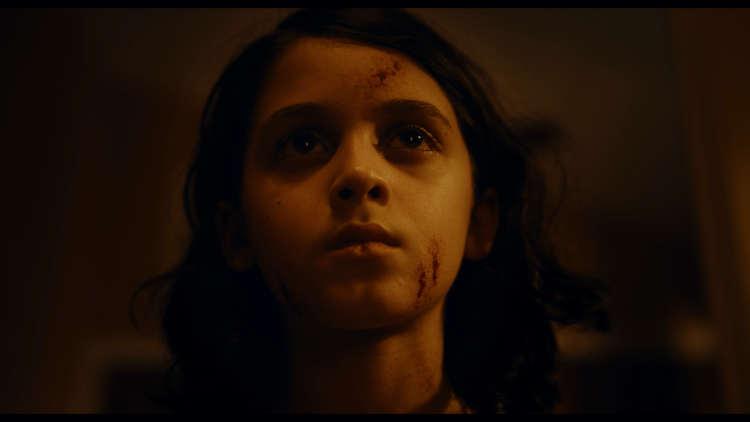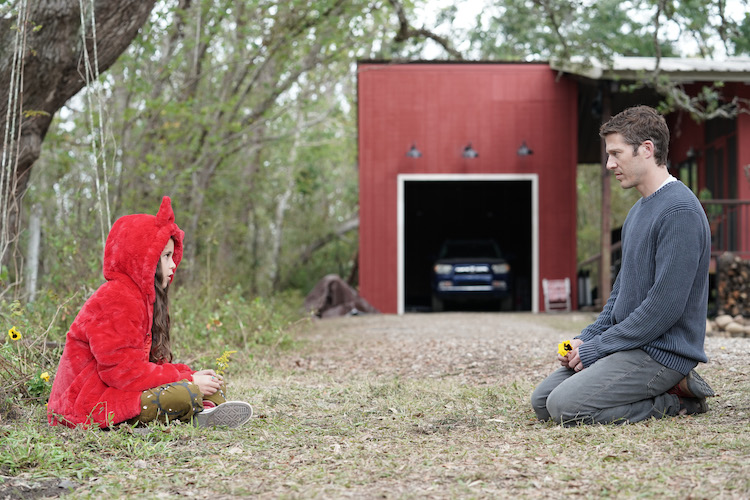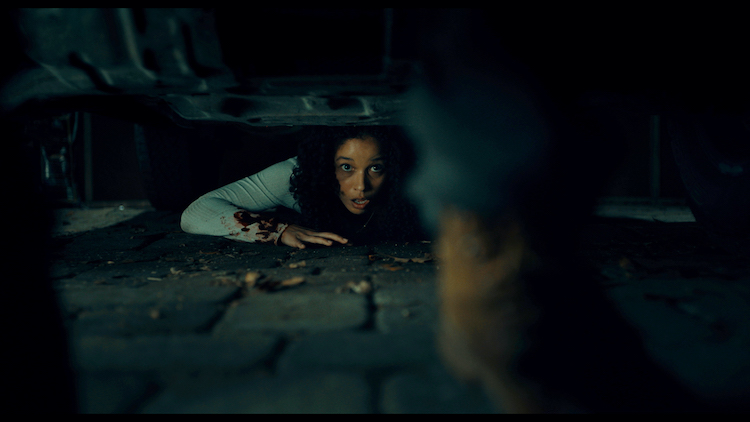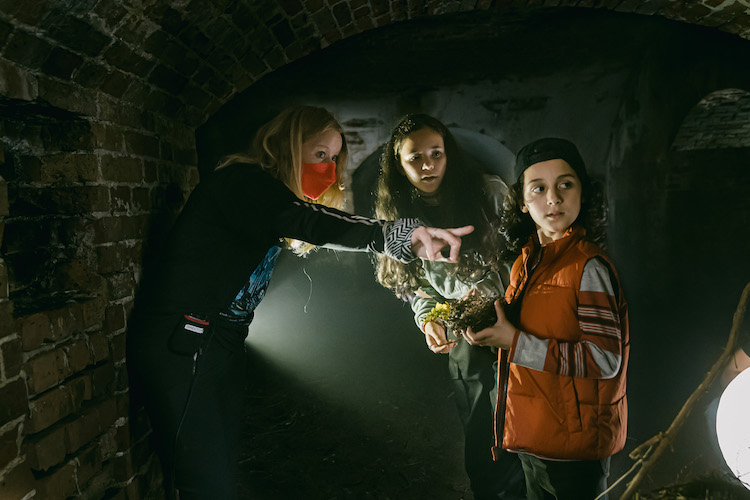I love a good creepy kid flick, and There’s Something Wrong with the Children certainly hits all the marks I’d expect, but it also throws in some unconventional ideas. When two couples, one with kids and one without, go on a retreat in the woods, something weird happens to the kids. Written by T.J. Cimfel and David White, the film stars Alisha Wainwright, Zach Gilford, Amanda Crew, Carlos Santos, and as the creepy kids, Briella Guiza and David Mattle.
 My affinity for this film draws more from the adults’ interactions with each other than from anything that happens with the children. I mean, the kids are sufficiently creepy, but it’s the way the parents interact with the childless couple that appeals to me. We all know those people who try to force their lifestyle choices on us, judging us on some level if we don’t want or believe the same things they do. We also probably all know those parents who think their kids are angels and think you’re the problem if you see another side to them. I love that the film represents both of these.
My affinity for this film draws more from the adults’ interactions with each other than from anything that happens with the children. I mean, the kids are sufficiently creepy, but it’s the way the parents interact with the childless couple that appeals to me. We all know those people who try to force their lifestyle choices on us, judging us on some level if we don’t want or believe the same things they do. We also probably all know those parents who think their kids are angels and think you’re the problem if you see another side to them. I love that the film represents both of these.
I also loved speaking with the film’s director, Roxanne Benjamin, who spoke with so much enthusiasm and energy. Check it out!
2022 was such a great year for horror films. What was your favorite horror film of the year?
“Man, that’s tough. I feel like whenever I get asked this question, I forget all movies. It’s the same thing with actors when I get asked, “Who are you thinking of for these roles?” I’m just like, “I’ve never seen an actor. I don’t know anyone’s name.” I couldn’t even tell you the people in my own movie’s name. It’s just like I freeze. I loved Barbarian. I thought Barbarian was super fun, but I feel like that’s on the top of everyone’s list. I feel like there’s probably some gems I’m not thinking of, but that’s the first one that comes to mind, just because it had that kind of Scream energy. It just felt like something new, even though it was taking something that we knew, it was using our knowledge of the genre against us in a way that, I think, is really fun. Oh, Orphan: First Kill, that’s my favorite. It’s a creepy kid movie without being a creepy kid movie. It really flips everything on its head in such a fun way. Well done. I loved that movie.”
What do you think it is about kids that make them so effectively creepy?
 “Gremlins. Something that acts on impulse and outside of social norms. It’s like you’re dealing with a wild animal; you don’t have any control over what’s going to happen in a situation, either what they’re gonna say or what they’re gonna do. They’re kind of like a little mystery alien species – you can tell I’m not a mother – so that’s kind of always been interesting to me. I feel like it’s an easy trope to lean into in horror. We’ve got a whole genre around it for a reason because there are so many different things.
“Gremlins. Something that acts on impulse and outside of social norms. It’s like you’re dealing with a wild animal; you don’t have any control over what’s going to happen in a situation, either what they’re gonna say or what they’re gonna do. They’re kind of like a little mystery alien species – you can tell I’m not a mother – so that’s kind of always been interesting to me. I feel like it’s an easy trope to lean into in horror. We’ve got a whole genre around it for a reason because there are so many different things.
“The original title for this movie was The Ravine, and it was kind of in a different iteration at the time. You have to make a lot of changes once you get into production, but one of the big ones was that, you had the script and the main thing was this ravine, and we were shooting in Louisiana, which is a river delta. No fucking ravines in a river delta, so you have to come up with almost a new mythology. First, it was like we've got to find a place, and where do they go? What happens when they get there? We found they have a bunch of old forts around New Orleans, so okay, what happens once they’re there that kind of lives within the DNA of the script? At the same time, you still have to reverse engineer what the mythology is and how they got there and all this stuff. It’s really fascinating how much these production choices affect the story that you’re telling once you get on the ground, but yeah. Naming the movie There’s Something Wrong with the Children, you know what this movie is. You know what you’re in for. No one’s trying to hide it. We’re not reinventing the wheel here. The fun of it then is just getting to play within the tropes and play with the genre itself. Who usually gets gas-lit?”
Women.
“It’s always their mental clarity that gets called into question. I’d love, in a theater, to yell out, “Who here is on mood stabilizers?” and see 90% of the audience raise their hand. If you consider that to be any sort of anti-anxiety, antidepressant anti-whatever, it’s our entire generation. Are we really gonna keep using “Oh, we’re not reliable because….“ Throwing that back in the face of the other gender was kind of a fun thing to play with, and then from there, trying to switch our narrator midstream to Alisha‘s character to carry the rest of the story when Zack wanders off was also a fun thing to do. I get to really play around with the tropes of the genre within this movie so that’s always fun as a director.”
 What were some of the worst things about working at that location?
What were some of the worst things about working at that location?
"Snakes and bugs and humidity. Again, we’re in the river delta. It’s October/November, but still the humidity is so intense; it just sticks to your skin. The snakes are everywhere, and it’s one of those things. You had to have a snake wrangler on set every day. The kids loved him. Oh my God, he was like the Pied Piper to David and Briella. Every day he’s catching two or three snakes, and he’d be like, “Oh yeah, that one was probably about five feet from where this was,” and it’s like, “Oh cool, I was just there.” It made me think about all the times that my DP and I would go out and scout locations and do stuff on weekends, and we didn’t have a snake wrangler with us when we were doing that, and he was like, “Oh yeah, you were probably surrounded that whole time,” and it’s like “Cool! All right!”
“I grew up in the woods, but I grew up in the northeastern woods. We had timber rattlesnakes, but they were very dormant, kind of chill. You never really see them. We’re not snake people. We have bears. We have mountain lions. We have shit like that. We don’t have snakes and insects. Smaller things really freak me out which is why, I think, I went with all this insect imagery. It’s also kind of like Lovecraftian underbelly. I’m very influenced by In the Mouth of Madness. That’s kind of always threaded through somehow. How the story within the story of In the Mouth of Madness with the evil kids in the town being changed over is my favorite thing, and I want to see that movie, that whole movie. I love what that does, too. It’s like you know what that movie is, even though you only have hints of it within the movie. That was a kind of big influence on how the kids are acting and what’s happening. Are they replaced? Are they not replaced? Is there something under their skin? Is it not?
“Honestly, the fun part about T.J. and David’s script is the fact that no one is trying to fix any of the kids. it’s not like, “Oh no, the kids are evil. How do we make them un-evil? It’s just like, “Oh fuck, the kids are evil. Get me out of here.” That’s a much more fun movie. You don’t have the twenty minutes of we have to get the thing and take it to the thing and whatever. That’s always like the boring part to me of the horror movie. It’s never what you want it to be, anyway. I just always try to build metaphor, birth canal imagery into the movie, by the woman who doesn’t want to have kids. Do with that what you will.”
How do you approach directing kids versus adults? And would you talk a little bit about the experience with Briella and David?
 “The first day we did our whole read-through with the script on Zoom with all the actors and everything, the producer was naming everyone off, and he said “David” and [David] unmutes and goes, “Excuse me it’s [pronounced] Daveed.” I was just like, “I love that kid.” They were great. You treat them like adults. You just talk to them the same way that you would any other actor. They might have less experience to draw from, but they have a world of emotion to draw from, still. I guess, it depends on how you direct. If you’re a director who uses “remember a time when you’re in a relationship and blah blah blah,” that’s not really gonna work as much. It’s more to the end, more to the emotion, the intensity of feeling, I think, in the direction. It makes you kind of look at that with your other actors, as well, so I think it’s an interesting kind of trickle effect.
“The first day we did our whole read-through with the script on Zoom with all the actors and everything, the producer was naming everyone off, and he said “David” and [David] unmutes and goes, “Excuse me it’s [pronounced] Daveed.” I was just like, “I love that kid.” They were great. You treat them like adults. You just talk to them the same way that you would any other actor. They might have less experience to draw from, but they have a world of emotion to draw from, still. I guess, it depends on how you direct. If you’re a director who uses “remember a time when you’re in a relationship and blah blah blah,” that’s not really gonna work as much. It’s more to the end, more to the emotion, the intensity of feeling, I think, in the direction. It makes you kind of look at that with your other actors, as well, so I think it’s an interesting kind of trickle effect.
“As soon as the kids get there, the priority is the kids – shooting everything you can with the kids – because your time with them is so limited. All the blocking has to do with how we move this around the kids so that half the time the kids aren’t even there, because we only get them for like two to four hours a day, and that’s it. They’re in every scene, so you really have to play Tetris with how you do your blocking and how you do your shots and everything. It’s very complicated, especially on a twenty-two-day schedule to figure that out, and it also changes the script a lot because the original script had a lot more action with the kids, and I had to come up with different set pieces in different sequences so that it would feel like the kids are there even if they’re not. You just have to be very judicious about how you shoot everything so that no one realizes the sleight of hand that you’re doing and that the kids are only there one percent of the time. It was tough.”
If you want to check out the film, There's Something Wrong with the Children is now playing On Demand and Digital! Here's the spoiler-filled trailer, if you don't care about knowing most of what transpires before seeing the movie.
